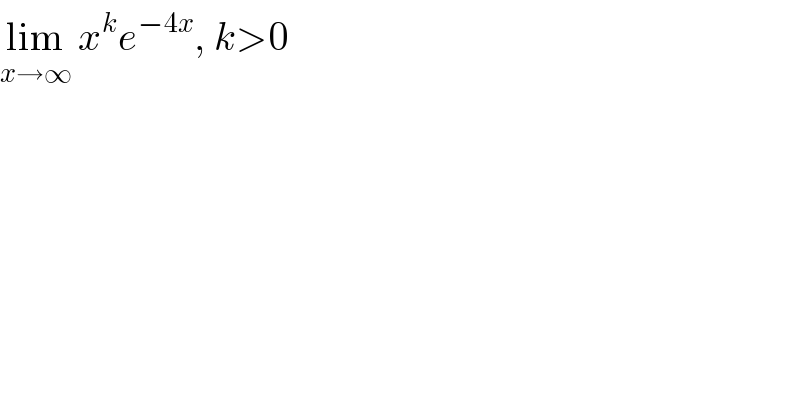
Question Number 76151 by Rio Michael last updated on 24/Dec/19

$$\underset{{x}\rightarrow\infty} {\mathrm{lim}}\:{x}^{{k}} {e}^{−\mathrm{4}{x}} ,\:{k}>\mathrm{0} \\ $$
Commented bykaivan.ahmadi last updated on 24/Dec/19

$${lim}_{{x}−\rightarrow\infty} \frac{{x}^{{k}} }{{e}^{\mathrm{4}{x}} }=\mathrm{0} \\ $$
Commented bykaivan.ahmadi last updated on 24/Dec/19

$${by}\:{k}+\mathrm{1}\:{derivation}\:{the}\:{x}^{{k}\:\:} {is}\:\mathrm{0} \\ $$
Commented bykaivan.ahmadi last updated on 24/Dec/19

$${lim}_{{x}\rightarrow\infty} \frac{\mathrm{0}}{\mathrm{4}^{{k}+\mathrm{1}} {e}^{\mathrm{4}{x}} }=\mathrm{0} \\ $$
Commented byRio Michael last updated on 24/Dec/19

$${thanks} \\ $$
Commented bymr W last updated on 24/Dec/19

$${if}\:{k}\:{is}\:{no}\:{integer},\:{k}+\mathrm{1}\:{th}\:{derivation} \\ $$ $${is}\:{not}\:{zero}. \\ $$
Commented bybenjo last updated on 24/Dec/19

$$\mathrm{yes}\:\mathrm{sir}.\:\mathrm{i}\:\mathrm{agree} \\ $$
